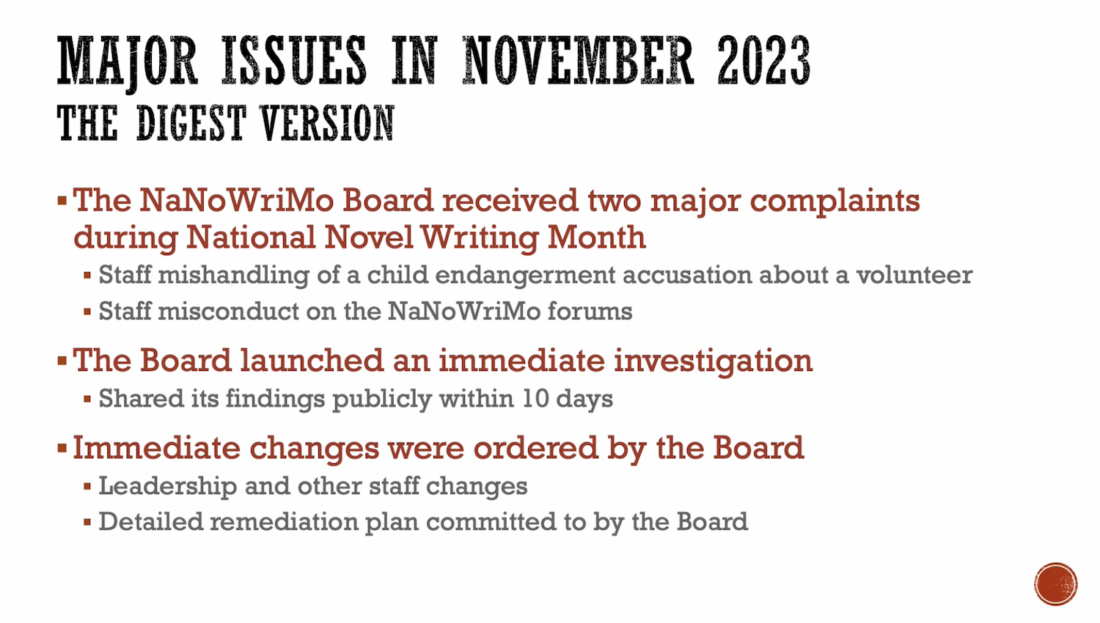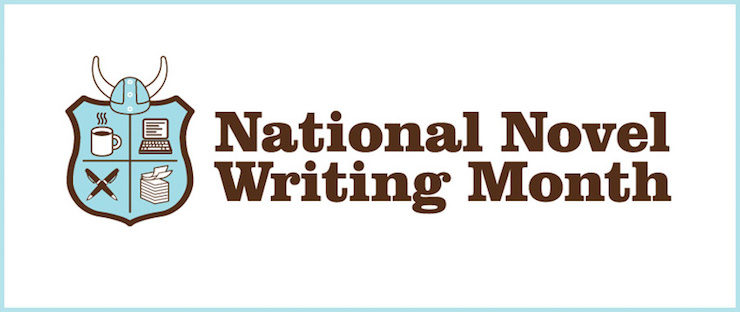On Monday night, NaNoWriMo—the organization behind the annual National Novel Writing Month, which takes place each November—sent an email to its community that began, “We come to you today with sad news. After six years of struggling to sustain itself financially, NaNoWriMo (the nonprofit) will begin the process of shutting down.”
That parenthetical—“(the nonprofit)”—seems worth highlighting. NaNoWriMo began in 1999, the brainchild of Chris Baty, who roped barely more than a dozen people in for year one. By 2001, the concept of writing 50,000 words over the course of November had spread to more than 5,000 people, according to Wikipedia. (The Wiki link leads to a dead page on the NaNoWriMo website, though.) This was long before social media. The concept is out there, and people will continue to engage with it—or hate it—regardless of the status of the organization.
It wasn’t until 2006 that the organization became a nonprofit. It trucked along for years; some books that began their lives as Nano novels went on to be traditionally published. In 2023, the NaNoWriMo board received complaints about one of its many volunteers. In a video posted last night by interim executive director Kilby Blades, the complaints are summarized as “Staff mishandling of a child endangerment accusation about a volunteer” and “Staff misconduct on the NaNoWriMo forums.” The forums were subsequently shut down, and Blades says new processes were put in place for vetting volunteers, who had previously not gone through background checks or been required to share their legal names with organizers.

Before this, Blades details, the organization had already been in financial troubles. And after that, in 2024, came a different kind of controversy over NaNoWriMo’s apparent stance on the use of so-called AI. The writing community was not pleased, and NaNoWriMo’s subsequent note on the topic did little to change opinions.
Blades gets into a lot of nitty-gritty detail about finances, the organization’s actions following the child endangerment accusations, and how things got to the point where shutting down is the only option. She says:
To blame NaNoWriMo’s demise on the events of the past year does a disservice to all struggling nonprofits. What hurt the organization far more and for far longer than any of those things was the fact that too many members of a very large, very engaged community let themselves believe the service we provided was free. Though we had tens of thousands of generous donors who carried the organization over the years, and so many volunteers who funded perks out of their own pockets, people to whom all of us owe a debt of gratitude, the vast majority of this tremendous community simply didn’t give. Believe me, I know that not everybody can give and that many people stretched to give what they could. My statements are not an indictment of a community I feel should have done more; they are a plea for you to look at the free services you use through a different lens.
Blades goes on to point out how arts nonprofits from public radio to Sesame Workshop are struggling.
The email sent by the organization is a bit more broad. Near the end, it says:
We recognize that the closure of NaNoWriMo represents a huge loss to the writing community, and that grief over this outcome will be exacerbated by the challenges of the past sixteen months. This is not the ending that anybody wanted or planned. And—believe us—if we could hit the delete button and rewrite this last chapter, we would. But we do have hope for the epilogue.
What’s next for NaNoWriMo, the indebted nonprofit, is much different from what’s next for actual Wrimos. We hold no belief that people will stop writing 50,000 words in November (and April, and July) or stop seeking support for the journey they’re on. Many alternatives to NaNoWriMo popped up this year, and people did find each other. In so many ways, it’s easier than it was when NaNoWriMo began in 1999 to find your writing tribe online.
Our greatest hope at this moment is that you do two things: support arts nonprofits you love (they really, truly need you) and keep writing words. Your stories matter.
You can watch the full video here:
Response to this news has been mixed. The NaNoWriMo subreddit has some lengthy discussions and a lot more perspectives on both the organization’s failures and the important role it has played for many writers. On social media, writers are mourning what the organization once was while also expressing deep frustration with what it became and how it has communicated.










